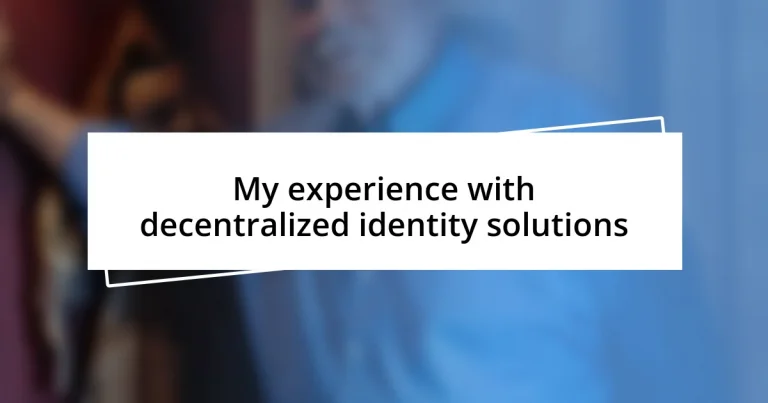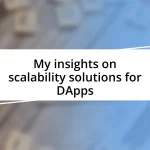Key takeaways:
- Decentralized identity empowers users with full ownership and control of their personal data, reducing reliance on third-party platforms.
- Key benefits include enhanced security, greater privacy, and reduced fraud through verifiable credentials and decentralized frameworks.
- Challenges in implementation include user interface inconsistencies, institutional skepticism, and navigating regulatory landscapes, but the future promises broader integration and user education to drive adoption.
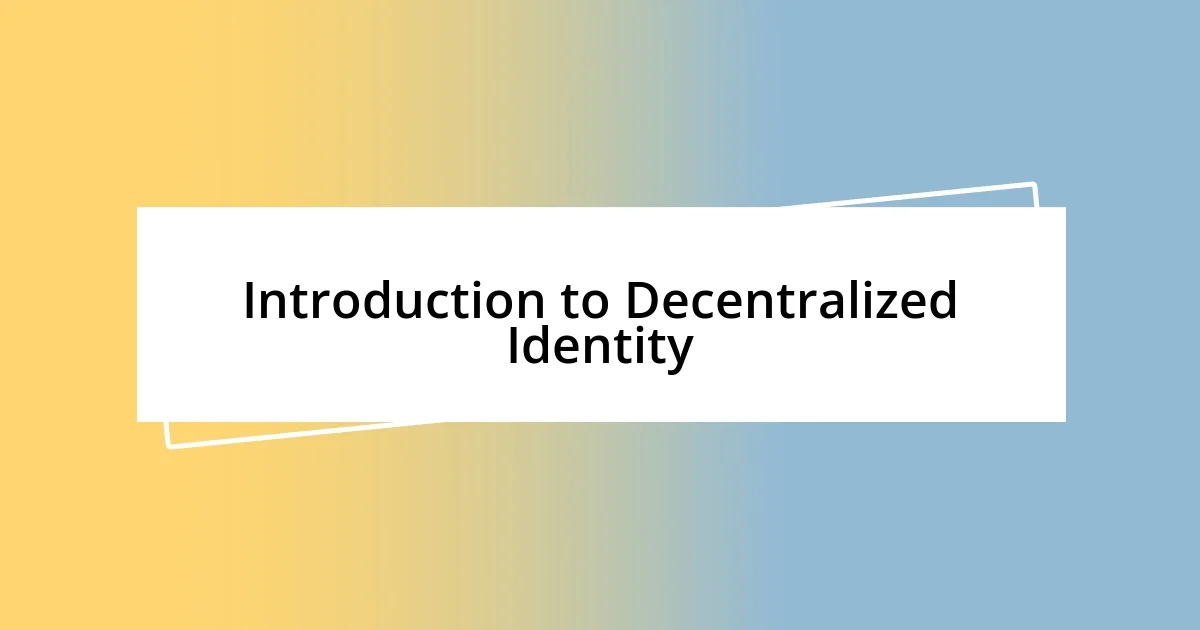
Introduction to Decentralized Identity
Decentralized identity solutions are reshaping the way we think about online identity and personal data security. Imagine having full ownership of your digital identity, without relying on third parties like social media platforms or banks. This concept not only empowers individuals but also raises questions: How much control do we really want over our personal information?
During my exploration of decentralized identity, I vividly recall the first time I realized the true potential of this technology. I attended a workshop where a passionate speaker shared stories of individuals reclaiming their privacy after years of data exploitation. It struck me how liberating it must feel to have the power to choose what information to share and with whom.
As I dove deeper, I often found myself pondering: What if we could eliminate the risks of identity theft and online fraud? With decentralized identity, the possibility becomes more tangible. This innovative approach allows for verifiable credentials that enhance trust in digital interactions, ultimately making our online experiences safer and more personal.
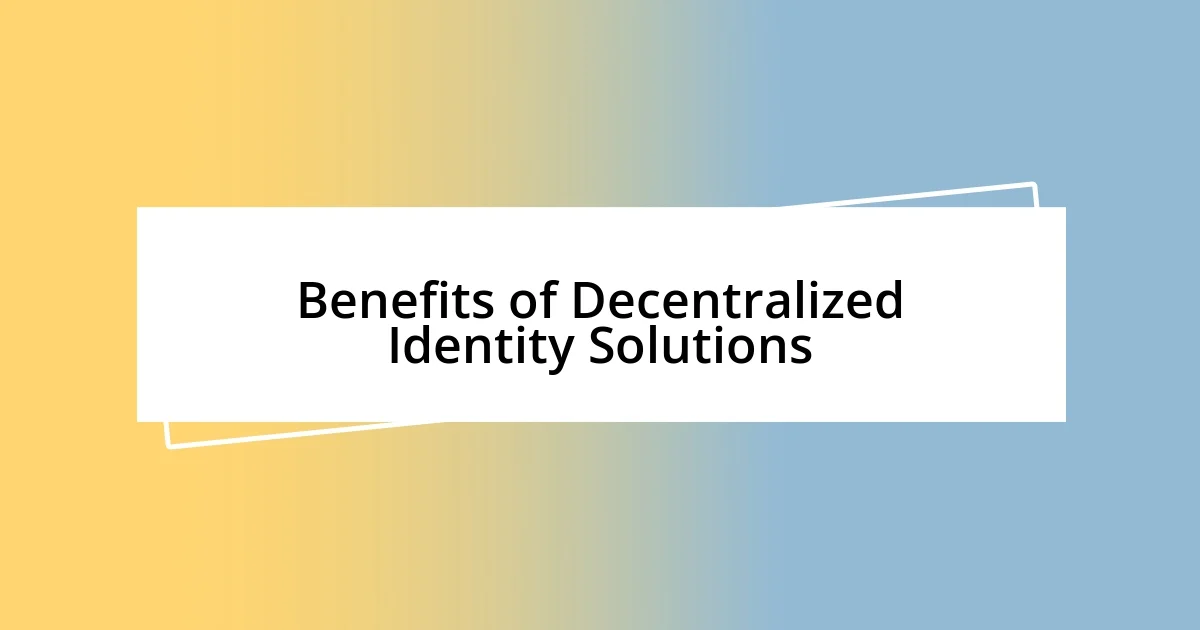
Understanding Decentralized Identity Solutions
Understanding decentralized identity solutions can seem daunting at first, but I’ve found them to be incredibly empowering. The idea that we can manage our identities without relying on centralized authorities really resonated with me. I remember learning about blockchain technology’s role in this ecosystem and how it can securely store credentials and personal data, allowing individuals to control access to their information.
What stood out during my research was the sheer complexity and promise of decentralized identity networks. It’s fascinating to think about how each person could become their own identity provider, effectively becoming a gatekeeper of their personal data. This notion not only enhances security but also creates a more equitable digital space. I recall discussing this with a tech-savvy friend who highlighted how these solutions could radically shift online interactions into a more trustworthy landscape.
I think it’s essential to grasp the essential differences between traditional and decentralized identity models. In a traditional framework, identity is often fragmented and managed by various entities, which can lead to data breaches. However, decentralized systems offer a more cohesive approach where users possess a single, portable identity. Reflecting on these differences made me realize that navigating the digital world could become less stressful and more secure.
| Traditional Identity | Decentralized Identity |
|---|---|
| Centralized control | User-owned and managed |
| Multiple accounts across platforms | Single, portable identity |
| Vulnerable to data breaches | Enhanced security through encryption |
| Limited user control | Full control over personal data |
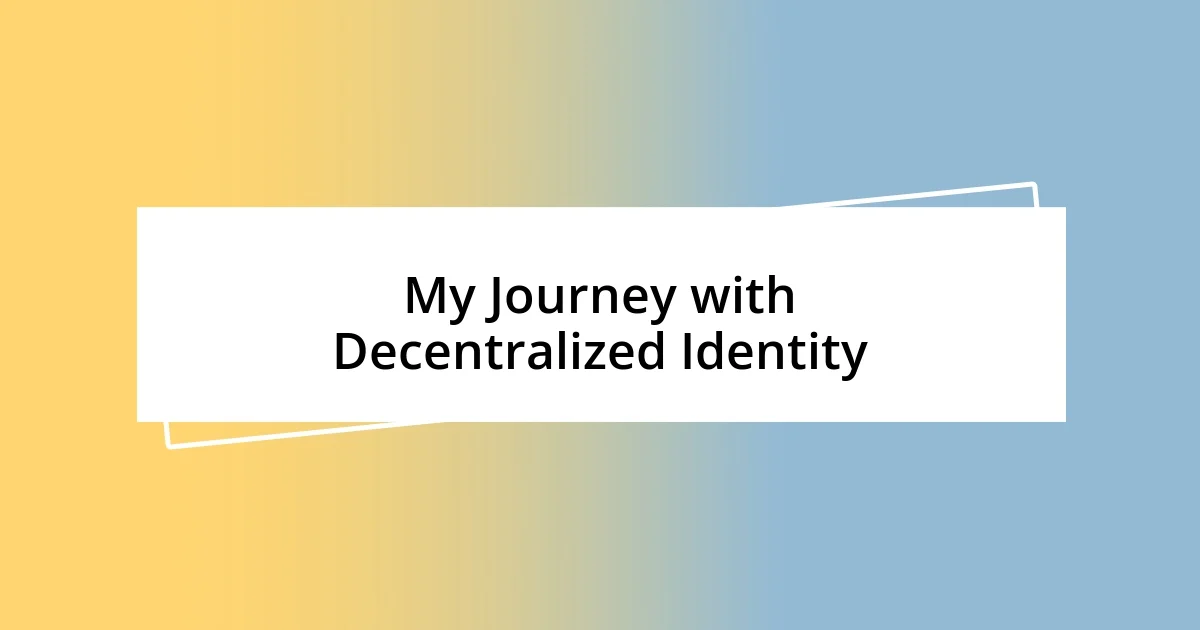
Key Benefits of Decentralized Identity
One of the most striking benefits of decentralized identity is the enhanced security it provides. I remember a time when a close friend of mine had her identity stolen, leading to a long, exhausting fight with various institutions to reclaim her digital life. The emotional toll it took on her was evident, and it made me realize that with decentralized solutions, we could significantly reduce such risks. Users have the power to control and verify their own identity without the need for vulnerable, centralized repositories.
Here are some key benefits that stand out to me:
- Ownership: Users fully own and control their identity, eliminating third-party dependencies.
- Privacy: Individuals can choose what information to share and with whom, fostering greater privacy.
- Reduced Fraud: The reliance on cryptographic proofs decreases the chances of identity theft and online fraud.
- Interoperability: Decentralized identities are often usable across multiple platforms, streamlining online interactions.
- Trust: Verifiable credentials strengthen trust between users and service providers, creating safer digital environments.
The idea of being a digital gatekeeper, as I like to call it, is incredibly empowering. I often think about my own experiences with sharing information online, regretting how little control I had over my data. Decentralized identities can fundamentally shift that narrative, giving me, and everyone else, a chance to navigate the online world on our terms.
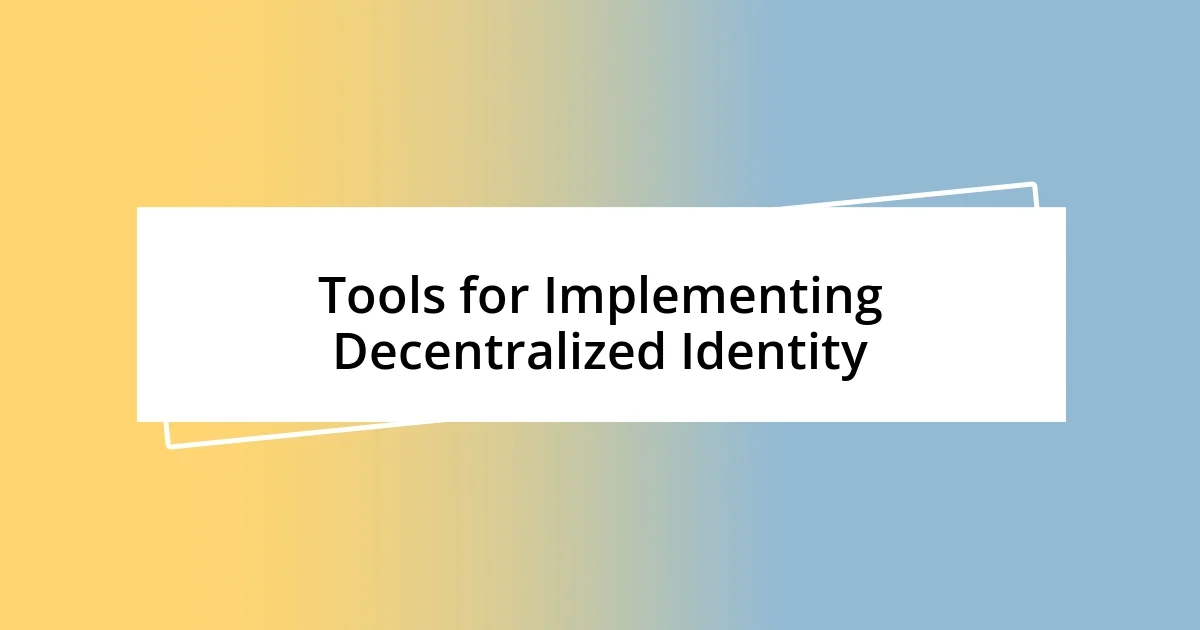
My Journey with Decentralized Identity
Embracing decentralized identity was like a breath of fresh air for me. I remember sitting in a coffee shop, laptop open, and feeling a mix of excitement and apprehension as I delved into the concept. The realization that I could take control of my own identity was both liberating and empowering. I mean, who doesn’t want to steer their own ship, especially in a digital world where data control feels like a myth?
One vivid moment that stands out was when I decided to test a decentralized identity application. The setup was surprisingly simple, yet the feeling of having a secure, personal vault for my credentials was intoxicating. It sparked a sense of responsibility in me—how I could now carefully choose what information to share and with whom. Have you ever felt that sense of freedom? It was like unlocking a door to a new digital dimension where I was in charge.
Reflecting on my journey, I’ve found that the emotional weight of giving up my data to big corporations often dulls the thrill of online interactions. But with decentralized identity, it feels as if the scales have tipped back in my favor. Every time I think about how I can manage my own identity securely, I can’t help but smile. It’s a powerful change, and I often wonder how different my digital experiences could have been had I embraced this sooner.
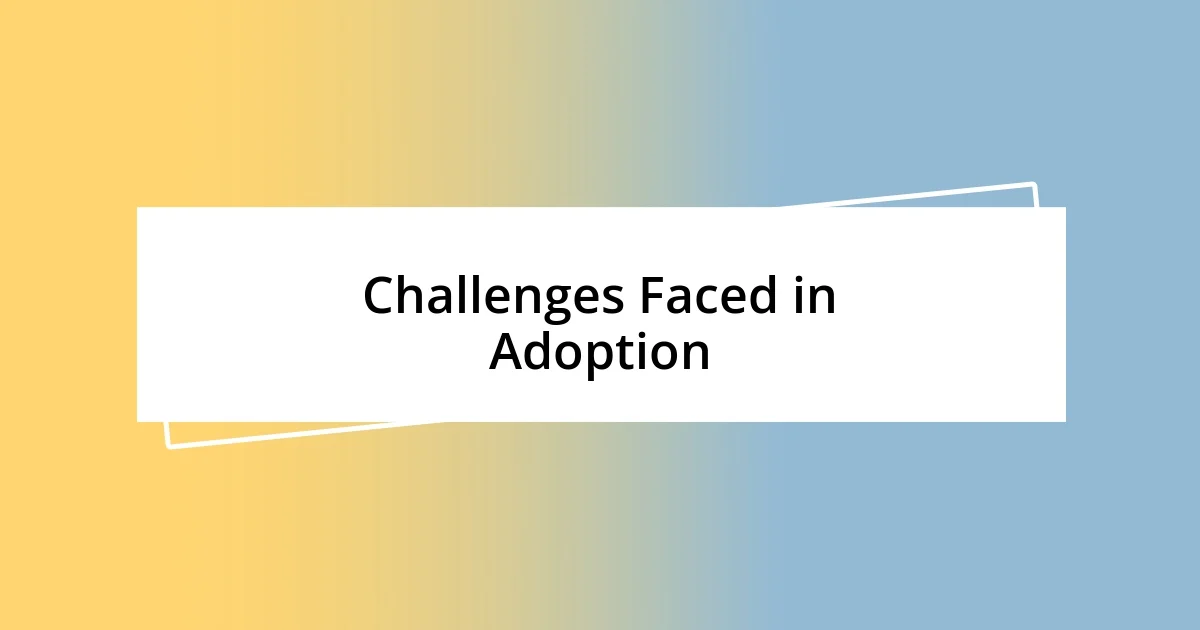
Tools for Managing Decentralized Identity
As I dove deeper into the world of decentralized identity, I discovered several tools that truly made a difference. One standout for me was the self-sovereign identity platforms, which allowed individuals to manage their credentials on their own terms. I remember the first time I used a digital wallet to store my identification; it felt like carrying a personal safe right in my pocket. How much more secure can you get than that?
Another tool that captured my attention was decentralized identity verification systems. They use blockchain technology to enable robust and tamper-proof identity proofing. I once participated in a verification process that used these systems, and I was charmed by how seamlessly it worked. There was no need for multiple verifications or excessive paperwork; everything was done through cryptographic proofs. Can you picture the possibilities if everyone had access to such technology?
Moreover, I can’t help but talk about the role of open-source protocols. I’ve seen how these frameworks empower developers and users alike to innovate and customize their identity solutions. When participating in community discussions about building better tools, it struck me how collaborative this space is. It’s a refreshing change in the tech world, fostering innovation and transparency. Isn’t it incredible how community-driven efforts are shaping our digital identities?
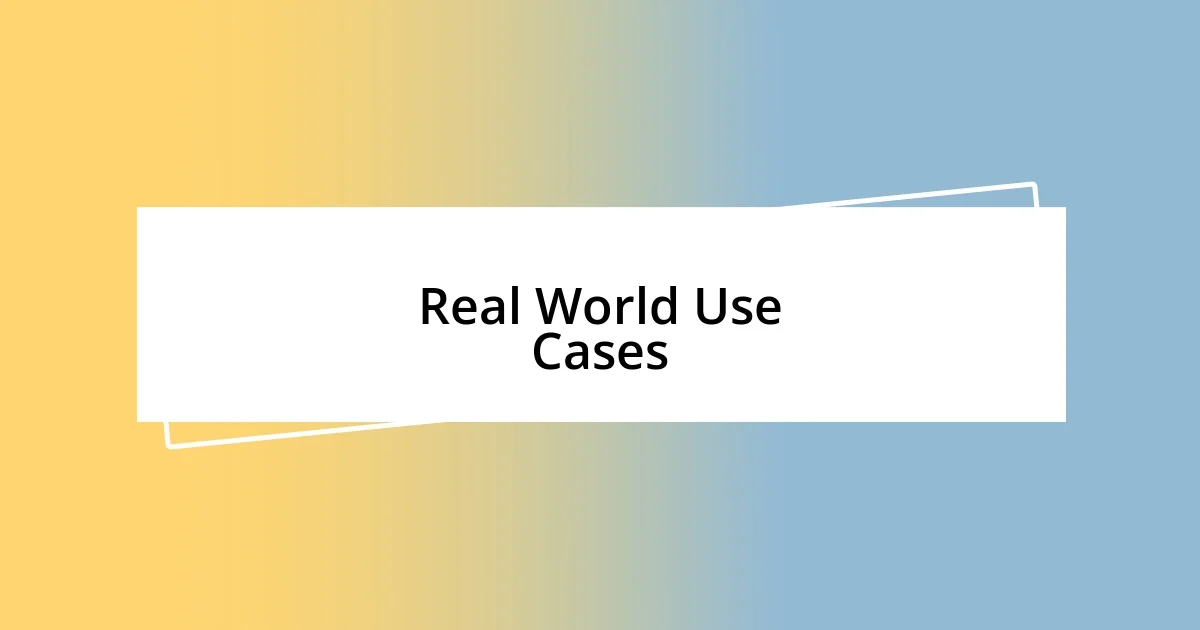
Challenges Encountered in Implementation
Delving into decentralized identity solutions certainly had its share of challenges. One particularly frustrating experience I encountered was the inconsistency in user interfaces across different platforms. I remember trying to navigate a new decentralized identity app, and it felt like a maze—each feature using a different terminology or function. Have you ever faced similar hurdles? It’s a disorienting experience that can easily deter users from fully embracing these innovative systems.
Another significant challenge was the skepticism from traditional institutions. There were times when I attempted to introduce decentralized identity to a few organizations, only to be met with resistance. Their reluctance often stemmed from a lack of understanding of the technology. I found myself having to explain the benefits repeatedly, which, honestly, could be quite exhausting. Did you ever feel the need to convince others of a great idea, only to feel like you’re hitting a wall?
Lastly, the regulatory landscape poses a considerable hurdle. I recall a discussion I had with a friend working in compliance. We both acknowledged that while decentralized identity has immense potential, navigating through the existing laws and regulations can be daunting. It’s like trying to find your way in a fog—what’s allowed today may change tomorrow. Isn’t it essential for innovation to have a clear path forward, especially in areas involving personal data?
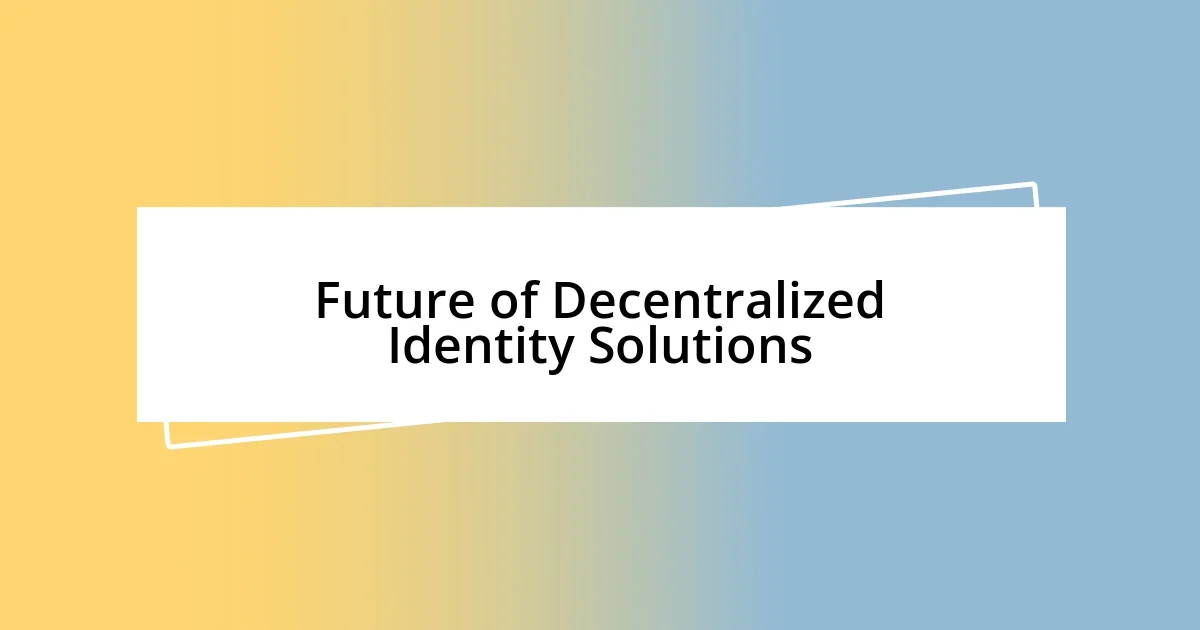
Future of Decentralized Identity Solutions
The future of decentralized identity solutions excites me because it promises to put individuals back in control of their digital lives. I often think about how our online identities are currently scattered across various platforms, each with its own security protocols. Imagine a world where you could access any service by proving your identity seamlessly and securely, all while protecting your personal data. Wouldn’t that be liberating?
One of the most promising aspects of this future is the potential for integration with emerging technologies. I recently discussed with a colleague how artificial intelligence could further enhance identity verification processes. Picture being able to verify identity almost instantaneously while utilizing biometric data, like facial recognition or fingerprints, without compromising privacy. It gets me wondering—how much could this innovation reduce fraud and increase trust in online transactions?
I also can’t help but reflect on the ongoing education that will be necessary for widespread adoption. In my experience, many people still equate decentralized systems with complexity and risk. However, as more user-friendly tools emerge and awareness grows, we’ll likely see a shift in perception. It’s thrilling to imagine how future generations will navigate their identities with ease. Are we ready to embrace this change and truly understand the power of decentralized identity solutions?












